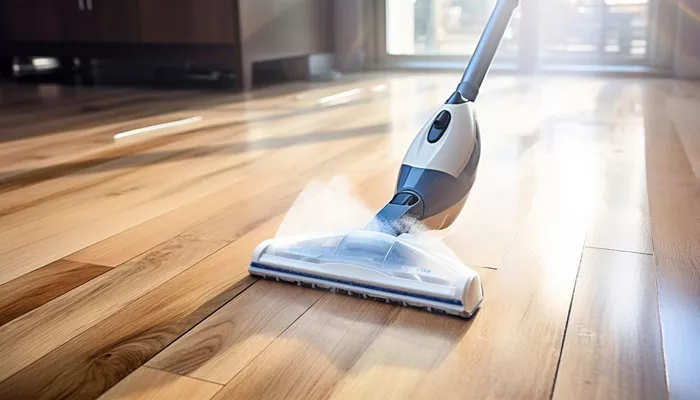Hardwood floors add beauty and warmth to any home, but keeping them clean can be frustrating. If you’ve just mopped your floors and they still look dirty, you’re not alone. Many people face this problem, and there are several reasons why it happens. In this article, we’ll explore the most common causes and solutions to ensure your hardwood floors stay truly clean.
Using the Wrong Cleaning Products
One of the biggest mistakes people make is using the wrong cleaner. Not all floor cleaners are safe or effective for hardwood.
Common Cleaning Product Mistakes
- Harsh chemicals – Some cleaners contain ammonia, bleach, or vinegar, which can damage wood over time.
- Soap buildup – Many cleaners leave a sticky residue that attracts more dirt.
- Wrong pH balance – Hardwood floors need a pH-neutral cleaner to avoid damage.
Solution
Use a cleaner specifically made for hardwood floors. Look for “hardwood-safe” labels. Avoid vinegar and soap-based cleaners.
Too Much Water When Mopping
Hardwood floors and water don’t mix well. Excess water can seep into the wood, causing warping, swelling, and long-term damage.
Signs You’re Using Too Much Water
- Streaks or cloudy residue after mopping
- Floor feels damp long after cleaning
- Warped or cupped boards over time
Solution
- Use a damp (not soaking wet) mop.
- Wring out the mop thoroughly before use.
- Dry the floor with a microfiber cloth after mopping.
Not Sweeping or Vacuuming Before Mopping
Mopping doesn’t remove dry dirt, dust, or pet hair. If you mop without sweeping first, you’re just pushing dirt around.
Why Pre-Sweeping Matters
- Dust and grit scratch the floor when mopped over.
- Pet hair clings to wet floors, making them look dirty.
- Dirt mixes with water, creating muddy streaks.
Solution
Always sweep, vacuum, or dry mop before wet mopping.
Dirty Mop Heads or Cleaning Tools
If your mop is dirty, you’re spreading grime instead of removing it.
Common Mop Problems
- Old mop heads trap dirt and bacteria.
- Sponge mops hold onto grease and grime.
- Reusing dirty water spreads filth.
Solution
- Wash mop heads after each use.
- Replace old mops regularly.
- Use clean water and change it when it gets dirty.
Buildup of Wax, Polish, or Old Cleaners
Over time, floor products can leave a sticky film that traps dirt.
Signs of Buildup
- Floors look dull or streaky.
- Dirt sticks quickly after mopping.
- Feet feel sticky when walking barefoot.
Solution
- Strip old wax or polish with a hardwood floor cleaner.
- Avoid wax-based products unless your floor requires them.
- Use a microfiber mop for a residue-free clean.
Hard Water Stains and Mineral Deposits
If your tap water is hard (high in minerals), it can leave white streaks or spots after mopping.
Signs of Hard Water Issues
- White, chalky residue after drying.
- Cloudy film on the floor.
- Spots that don’t wipe away easily.
Solution
- Use distilled or filtered water for mopping.
- Dry floors immediately after mopping.
- Install a water softener if hard water is a recurring problem.
Not Cleaning Often Enough
If dirt builds up over time, a single mopping won’t be enough.
How Often Should You Mop?
- High-traffic areas: 1-2 times per week.
- Low-traffic areas: Once every 1-2 weeks.
- Homes with pets/kids: More frequently.
Solution
Stick to a regular cleaning schedule to prevent deep grime buildup.
Using the Wrong Mop Type
Some mops work better than others on hardwood.
Best Mops for Hardwood
- Microfiber mops – Best for trapping dust and avoiding streaks.
- Flat mops with washable pads – Good for light cleaning.
- Spray mops – Convenient for quick cleanups.
Worst Mops for Hardwood
- String mops – Too wet and can scratch floors.
- Steam mops – Heat and moisture can damage wood.
- Rag mops – Often leave lint and streaks.
Solution
Switch to a microfiber or hardwood-safe mop.
Foot Traffic After Mopping
Walking on freshly mopped floors can leave footprints and dirt behind.
How to Prevent
- Wait until floors are completely dry before walking.
- Place rugs in high-traffic areas.
- Ask family members to avoid the area while drying.
Pet Hair and Dander
Pets shed hair and dander, which clings to floors even after mopping.
How to Fix
- Use a rubber broom to lift hair before mopping.
- Vacuum with a hardwood floor attachment.
- Mop with a microfiber pad that traps hair.
Not Addressing Deep Stains and Grime
Some dirt gets ground into the wood and won’t come up with regular mopping.
How to Remove Tough Stains
- For sticky spills: Use a slightly damp cloth with hardwood cleaner.
- For scuff marks: Try a magic eraser (gently).
- For deep stains: Sand and refinish if necessary.
Humidity and Temperature Changes
Wood expands and contracts with humidity, which can trap dirt in gaps.
How to Minimize
- Keep indoor humidity between 35-55%.
- Use a dehumidifier in damp areas.
- Avoid extreme temperature changes.
Final Tips for Keeping Hardwood Floors Clean
- Sweep daily – Prevents dirt buildup.
- Use the right cleaner – Avoid harsh chemicals.
- Mop with care – Less water, more drying.
- Protect high-traffic areas – Rugs help.
- Maintain your floors – Refinish when needed.
Conclusion
If your hardwood floors still look dirty after mopping, the problem is usually due to one (or more) of these reasons. The key is using the right tools, techniques, and cleaning products. By following these tips, you’ll keep your floors looking shiny and new for years.
Remember: Hardwood floors require gentle care. Avoid excess water, harsh chemicals, and rough cleaning tools. With the right approach, you’ll never have to wonder why your floors aren’t clean again.
Related topics:
What is the Best Way to Scrub?
What is the Best Shower Scrubber: A Comprehensive Guide
What is the Best Electric Floor Cleaner: A Comprehensive Guide

